First off, sorry I’ve been gone so long. This is exam/project/essay season. I really do care about this blog still, but school comes first. As does the newest season of Doctor Who–but that’s over now, too.
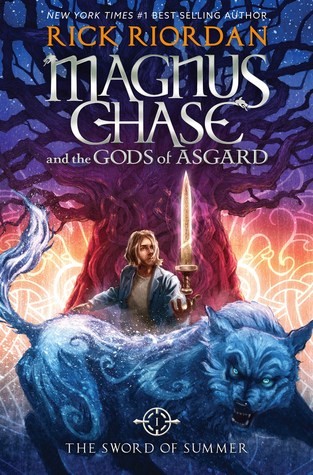
Rating: 4/5 stars
Review: Maybe I’m being a little harsh but, while this book is certainly a fantastic start to what looks to be a promising series, it’s not as good as The Lightening Thief. Still, Riordan makes improvements in some areas.
Take the character list. We have a blonde teen as the protagonist Magnus Chase. Then we have his friends: Hearth, who’s deaf, and Blitz, who’s–well, he doesn’t easily fit a mold. Riordan makes an effort for diversity, too, by including Samirah Al Abbas, a Muslim Valkyrie. Annabeth pops up again, too.
Some of the side characters are different from Riordan’s previous work, but Magnus has the same voice and personality as Percy Jackson and Jason Grace. Magnus says all the right things. Even though he gets himself into trouble, he manages to find a way out. He’s snarky and cheesy and loves adventure. He’s the typical hero; I’ve read a number of books in his voice before and, frankly, I’m bored with him. I think Riordan’s philosophy on this is “it’s worked well before,” but this book sounds too similar to the Percy Jackson series for my liking.
That’s not to say it’s a bad book, nor does it follow the exact same path as the previous mythical adaptations. What I think I like most about this book is the lack of romance for the main character. The fact that this is a bestselling YA page-turner without any romance is refreshing.
It’s also different because it lacks the formal “camp” setting that runs through the Percy Jackson and subsequent Heroes of Olympus series. There’s a sort of gathering place for the Norse demigods in the afterlife, but most of the book takes place on a quest. In that way, it’s a little more like the Kane Chronicles.
The book fails to live up to my usual standards for Riordan, though. The climax falls short of the suspense I want it to have. Really, the whole plot lacks tension. I wanted to see the progression of characters. The plot didn’t startle me at all–in fact, it was fairly predictable. I never bought into the whole “end of the world” scenario because I know Riordan’s not going to do that to me. I’m disappointed he didn’t take more risks with this book by putting characters at risk.
Riordan does well shaping the characters of Samirah and Heath, though. Whatever else may be afflicting this book, at least those two are solid characters, unique to the series. And even though the novel runs in the same vein as the other books in this mythical universe, the mythical universe itself is original, and it seems Riordan still has more to explore.
Recommendation: Honestly I feel too old to be reading this series still, but I appreciate the nostalgia of going back to a world I remember losing myself in throughout middle school and high school. It’s not obscene and the violence is mild. While I believe the book is best suited for middle school or upper elementary school students, those who have been exploring this world with Riordan for a while will likely still find pleasure in this novel.

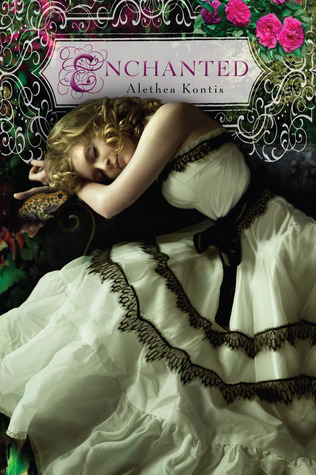 Enchanted brings the fairy tale world to life, mixing dozens of fairy tales in an irresistible concoction. Kontis focuses on the princess and the frog story (which, if you haven’t read the Grimm’s version yet, please do so; you’re in for quite the shock). This book was intoxicating to the point where overly-fantastical character names and nauseating romance seemed almost normal–exactly what I want from a fairy tale adaptation. I think it helped that I was such a fairy tale nerd. Plus, it’s safe for all ages.
Enchanted brings the fairy tale world to life, mixing dozens of fairy tales in an irresistible concoction. Kontis focuses on the princess and the frog story (which, if you haven’t read the Grimm’s version yet, please do so; you’re in for quite the shock). This book was intoxicating to the point where overly-fantastical character names and nauseating romance seemed almost normal–exactly what I want from a fairy tale adaptation. I think it helped that I was such a fairy tale nerd. Plus, it’s safe for all ages.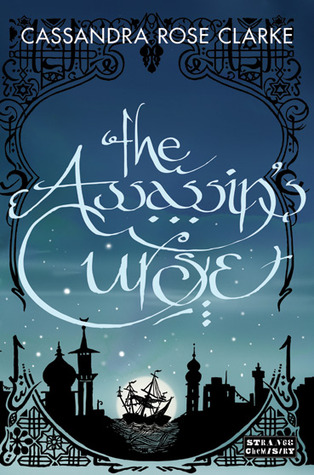 The Assassin’s Curse blends a middle-eastern setting with a magical world. What really bought my love in this book is the main character, Ananna of the Tanarau. Besides sounding like the French word for pineapple, Ananna is witty, intelligent, fiery, and really everything I could ask for in a main character. The assassin whose life she saves is equally as captivating and I couldn’t help but ship them. Besides, who doesn’t love a good pirate book?
The Assassin’s Curse blends a middle-eastern setting with a magical world. What really bought my love in this book is the main character, Ananna of the Tanarau. Besides sounding like the French word for pineapple, Ananna is witty, intelligent, fiery, and really everything I could ask for in a main character. The assassin whose life she saves is equally as captivating and I couldn’t help but ship them. Besides, who doesn’t love a good pirate book? The Treachery of Beautiful Things is another book that mixes fairy tales, but it’s surprisingly dark and most of the characters have normal names this time! It drew more from the fey of “A Midsummer Night’s Dream” and less from the fairies of Grimm, Anderson, or Perrault. I loved the brother-sister relationship and Jack interested me from the start, shrouded in secrets as he was. Most of all, I loved the main idea that the more beautiful something is, the more treacherous it is (thus the title). It applies to the cover itself, which, though beautiful, annoys me because of the use of a stock photo… Nonetheless, The Treachery of Beautiful Things is a must-read for faery lovers.
The Treachery of Beautiful Things is another book that mixes fairy tales, but it’s surprisingly dark and most of the characters have normal names this time! It drew more from the fey of “A Midsummer Night’s Dream” and less from the fairies of Grimm, Anderson, or Perrault. I loved the brother-sister relationship and Jack interested me from the start, shrouded in secrets as he was. Most of all, I loved the main idea that the more beautiful something is, the more treacherous it is (thus the title). It applies to the cover itself, which, though beautiful, annoys me because of the use of a stock photo… Nonetheless, The Treachery of Beautiful Things is a must-read for faery lovers.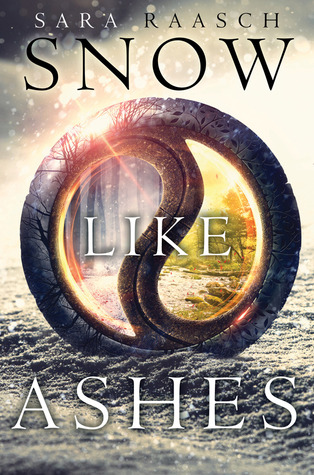 Snow Like Ashes is my most recent read, and since it just came out I’m certain it will gain more ratings soon. It certainly deserves it. Raasch first wrote this book when she was 12 years old, but it is in no way childish. The warring kingdoms plot is tired, but this novel is different in that the kingdom of the protagonist, Meira, was defeated. It is ultimately up to her and seven other refugees to save those who survive in labor camps. The use of magic in this book is also unique, since each kingdom has a conduit and each of the Season kingdoms lives constantly in their season. (Meira’s kingdom, for example, was constantly winter.) The use of an alternative weapon (a chakram) is applaudable and the fierceness and depth of Meira drew me to her from the start. Though I’m always a skeptic of love triangles (who could possibly win the heart of two men?), this love triangle feels natural. I mean, who couldn’t love Meira? Especially considering what the plot twist reveals…
Snow Like Ashes is my most recent read, and since it just came out I’m certain it will gain more ratings soon. It certainly deserves it. Raasch first wrote this book when she was 12 years old, but it is in no way childish. The warring kingdoms plot is tired, but this novel is different in that the kingdom of the protagonist, Meira, was defeated. It is ultimately up to her and seven other refugees to save those who survive in labor camps. The use of magic in this book is also unique, since each kingdom has a conduit and each of the Season kingdoms lives constantly in their season. (Meira’s kingdom, for example, was constantly winter.) The use of an alternative weapon (a chakram) is applaudable and the fierceness and depth of Meira drew me to her from the start. Though I’m always a skeptic of love triangles (who could possibly win the heart of two men?), this love triangle feels natural. I mean, who couldn’t love Meira? Especially considering what the plot twist reveals…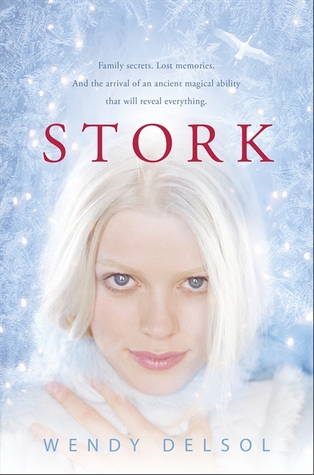 Stork blends Norse myth with Hans Christian Andersen’s “The Snow Queen.” Though it starts off in the usual “pretty girl’s parents divorce and she moves to new town and new school” format, Delsol constructed a one-of-a-kind plot. The main character, Kat, is the first fashion-savvy character I’ve read about in YA, but she was also funny (and, we later find, quite powerful). The series didn’t seem completely natural to me (the romance included), but the unique concepts really pushed this book to five stars.
Stork blends Norse myth with Hans Christian Andersen’s “The Snow Queen.” Though it starts off in the usual “pretty girl’s parents divorce and she moves to new town and new school” format, Delsol constructed a one-of-a-kind plot. The main character, Kat, is the first fashion-savvy character I’ve read about in YA, but she was also funny (and, we later find, quite powerful). The series didn’t seem completely natural to me (the romance included), but the unique concepts really pushed this book to five stars. Just look at that cover! Wrapped is a historical fiction novel that features an intelligent (yet confined) debutante. I never knew the popularity of unwrapping Egyptian mummies among the wealthy during the Regency period; it’s simultaneously grotesque and intriguing. More points to this book for teaching me something new! I love the time period, the plot, and, most of all, the protagonist. Agnes is nerdy, funny, and complex; besides, who can resist a fellow Jane Austen fan? Between Agnes, the plot, and the cover, you’re sure to like this novel.
Just look at that cover! Wrapped is a historical fiction novel that features an intelligent (yet confined) debutante. I never knew the popularity of unwrapping Egyptian mummies among the wealthy during the Regency period; it’s simultaneously grotesque and intriguing. More points to this book for teaching me something new! I love the time period, the plot, and, most of all, the protagonist. Agnes is nerdy, funny, and complex; besides, who can resist a fellow Jane Austen fan? Between Agnes, the plot, and the cover, you’re sure to like this novel. By now, I’m pretty sure you’ve figured out how much I judge books by their covers. Linked is no exception. Just look at that beauty! But the cover isn’t all. Howson’s sci-fi focuses on a once-popular schoolgirl turned ill. When the protagonist discovers the reason for her mysterious bruises, pains, and visions, the plot takes off, and I happily flew along. Twins, a love/hate relationship, and a run from a utopian society make this novel one of my favorites. (And the sequel is just as good.)
By now, I’m pretty sure you’ve figured out how much I judge books by their covers. Linked is no exception. Just look at that beauty! But the cover isn’t all. Howson’s sci-fi focuses on a once-popular schoolgirl turned ill. When the protagonist discovers the reason for her mysterious bruises, pains, and visions, the plot takes off, and I happily flew along. Twins, a love/hate relationship, and a run from a utopian society make this novel one of my favorites. (And the sequel is just as good.)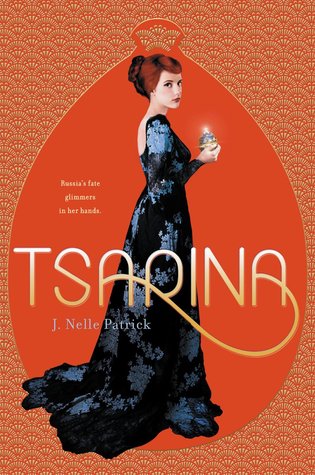 Do not read this if you are passionate about historical adaptations remaining factual. Though the events of this historical fantasy are rooted in true events of the Russian Revolution, it does deviate quite a bit. I thought the fantastical aspects fit into the time period quite well, given the magical qualities of Rasputin. The main character, Natalya, is both loyal to the Romanovs and sympathetic towards Russian peasants. She is feisty, independent, and lovable. The love between her and Alexi was believable and subtle, and my main ship was even more convincing. It helps that I love the name Leo.
Do not read this if you are passionate about historical adaptations remaining factual. Though the events of this historical fantasy are rooted in true events of the Russian Revolution, it does deviate quite a bit. I thought the fantastical aspects fit into the time period quite well, given the magical qualities of Rasputin. The main character, Natalya, is both loyal to the Romanovs and sympathetic towards Russian peasants. She is feisty, independent, and lovable. The love between her and Alexi was believable and subtle, and my main ship was even more convincing. It helps that I love the name Leo. The Glass Maker’s Daughter threw me into a new world full of magic lightly based on medieval Italy, where seven entitled families practice each specialize in an art to the point of magic. The main character, Risa Divetri, grew up in the family that specialized in glass making–that’s what got me to pick up this book in the first place. Glass has always enchanted me; who’s to say it couldn’t hold actual enchantment? It impressed me because it had all the romance and intrigue without all the sex and gore. Risa’s magic did not manifest until later, but I appreciated that; after all, who needs magic to be special? Risa makes a path for herself without any supernatural abilities.
The Glass Maker’s Daughter threw me into a new world full of magic lightly based on medieval Italy, where seven entitled families practice each specialize in an art to the point of magic. The main character, Risa Divetri, grew up in the family that specialized in glass making–that’s what got me to pick up this book in the first place. Glass has always enchanted me; who’s to say it couldn’t hold actual enchantment? It impressed me because it had all the romance and intrigue without all the sex and gore. Risa’s magic did not manifest until later, but I appreciated that; after all, who needs magic to be special? Risa makes a path for herself without any supernatural abilities. How could this book not have more ratings? The House of Windjammer may have a slow start, but don’t let that stop you. I learned more through this novel than through any other book listed here. Did you know the Dutch were once so crazed about tulips they treated various varieties like investments or stocks? Did you know Dutch trade with the Americas was dictated by private companies (primarily the Dutch West India Company)? Did you know how much worse banks were back in the 1600s? The novel made clear the heavy amount of research the author did on the 1630s in Amsterdam. Even the characters are flawed to the point of realisticness. And did I mention there’s another love/hate romance brewing? My favorite kind!
How could this book not have more ratings? The House of Windjammer may have a slow start, but don’t let that stop you. I learned more through this novel than through any other book listed here. Did you know the Dutch were once so crazed about tulips they treated various varieties like investments or stocks? Did you know Dutch trade with the Americas was dictated by private companies (primarily the Dutch West India Company)? Did you know how much worse banks were back in the 1600s? The novel made clear the heavy amount of research the author did on the 1630s in Amsterdam. Even the characters are flawed to the point of realisticness. And did I mention there’s another love/hate romance brewing? My favorite kind!